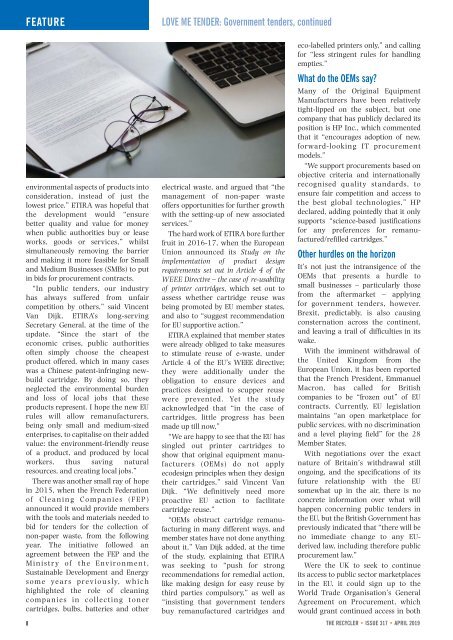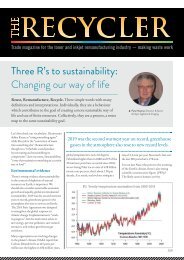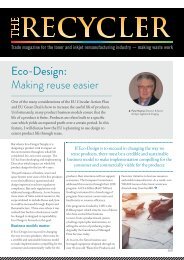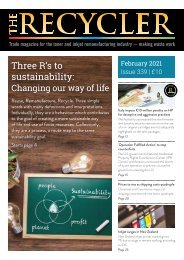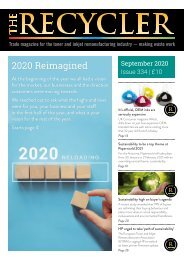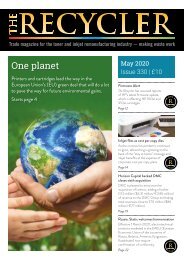The Recycler Issue 317
Create successful ePaper yourself
Turn your PDF publications into a flip-book with our unique Google optimized e-Paper software.
FEATURE<br />
LOVE ME TENDER: Government tenders, continued<br />
environmental aspects of products into<br />
consideration, instead of just the<br />
lowest price.” ETIRA was hopeful that<br />
the development would “ensure<br />
better quality and value for money<br />
when public authorities buy or lease<br />
works, goods or services,” whilst<br />
simultaneously removing the barrier<br />
and making it more feasible for Small<br />
and Medium Businesses (SMBs) to put<br />
in bids for procurement contracts.<br />
“In public tenders, our industry<br />
has always suffered from unfair<br />
competition by others,” said Vincent<br />
Van Dijk, ETIRA’s long-serving<br />
Secretary General, at the time of the<br />
update. “Since the start of the<br />
economic crises, public authorities<br />
often simply choose the cheapest<br />
product offered, which in many cases<br />
was a Chinese patent-infringing newbuild<br />
cartridge. By doing so, they<br />
neglected the environmental burden<br />
and loss of local jobs that these<br />
products represent. I hope the new EU<br />
rules will allow remanufacturers,<br />
being only small and medium-sized<br />
enterprises, to capitalise on their added<br />
value: the environment-friendly reuse<br />
of a product, and produced by local<br />
workers, thus saving natural<br />
resources, and creating local jobs.”<br />
<strong>The</strong>re was another small ray of hope<br />
in 2015, when the French Federation<br />
of Cleaning Companies (FEP)<br />
announced it would provide members<br />
with the tools and materials needed to<br />
bid for tenders for the collection of<br />
non-paper waste, from the following<br />
year. <strong>The</strong> initiative followed an<br />
agreement between the FEP and the<br />
Ministry of the Environment,<br />
Sustainable Development and Energy<br />
some years previously, which<br />
highlighted the role of cleaning<br />
companies in collecting toner<br />
cartridges, bulbs, batteries and other<br />
electrical waste, and argued that “the<br />
management of non-paper waste<br />
offers opportunities for further growth<br />
with the setting-up of new associated<br />
services.”<br />
<strong>The</strong> hard work of ETIRA bore further<br />
fruit in 2016-17, when the European<br />
Union announced its Study on the<br />
implementation of product design<br />
requirements set out in Article 4 of the<br />
WEEE Directive – the case of re-usability<br />
of printer cartridges, which set out to<br />
assess whether cartridge reuse was<br />
being promoted by EU member states,<br />
and also to “suggest recommendation<br />
for EU supportive action.”<br />
ETIRA explained that member states<br />
were already obliged to take measures<br />
to stimulate reuse of e-waste, under<br />
Article 4 of the EU’s WEEE directive;<br />
they were additionally under the<br />
obligation to ensure devices and<br />
practices designed to scupper reuse<br />
were prevented. Yet the study<br />
acknowledged that “in the case of<br />
cartridges, little progress has been<br />
made up till now,”<br />
“We are happy to see that the EU has<br />
singled out printer cartridges to<br />
show that original equipment manufacturers<br />
(OEMs) do not apply<br />
ecodesign principles when they design<br />
their cartridges,” said Vincent Van<br />
Dijk. “We definitively need more<br />
proactive EU action to facilitate<br />
cartridge reuse.”<br />
“OEMs obstruct cartridge remanufacturing<br />
in many different ways, and<br />
member states have not done anything<br />
about it,” Van Dijk added, at the time<br />
of the study, explaining that ETIRA<br />
was seeking to “push for strong<br />
recommendations for remedial action,<br />
like making design for easy reuse by<br />
third parties compulsory,” as well as<br />
“insisting that government tenders<br />
buy remanufactured cartridges and<br />
eco-labelled printers only,” and calling<br />
for “less stringent rules for handling<br />
empties.”<br />
What do the OEMs say?<br />
Many of the Original Equipment<br />
Manufacturers have been relatively<br />
tight-lipped on the subject, but one<br />
company that has publicly declared its<br />
position is HP Inc., which commented<br />
that it “encourages adoption of new,<br />
forward-looking IT procurement<br />
models.”<br />
“We support procurements based on<br />
objective criteria and internationally<br />
recognised quality standards, to<br />
ensure fair competition and access to<br />
the best global technologies,” HP<br />
declared, adding pointedly that it only<br />
supports “science-based justifications<br />
for any preferences for remanufactured/refilled<br />
cartridges.”<br />
Other hurdles on the horizon<br />
It’s not just the intransigence of the<br />
OEMs that presents a hurdle to<br />
small businesses – particularly those<br />
from the aftermarket – applying<br />
for government tenders, however.<br />
Brexit, predictably, is also causing<br />
consternation across the continent,<br />
and leaving a trail of difficulties in its<br />
wake.<br />
With the imminent withdrawal of<br />
the United Kingdom from the<br />
European Union, it has been reported<br />
that the French President, Emmanuel<br />
Macron, has called for British<br />
companies to be “frozen out” of EU<br />
contracts. Currently, EU legislation<br />
maintains “an open marketplace for<br />
public services, with no discrimination<br />
and a level playing field” for the 28<br />
Member States.<br />
With negotiations over the exact<br />
nature of Britain’s withdrawal still<br />
ongoing, and the specifications of its<br />
future relationship with the EU<br />
somewhat up in the air, there is no<br />
concrete information over what will<br />
happen concerning public tenders in<br />
the EU, but the British Government has<br />
previously indicated that “there will be<br />
no immediate change to any EUderived<br />
law, including therefore public<br />
procurement law.”<br />
Were the UK to seek to continue<br />
its access to public sector marketplaces<br />
in the EU, it could sign up to the<br />
World Trade Organisation’s General<br />
Agreement on Procurement, which<br />
would grant continued access in both<br />
8 THE RECYCLER • ISSUE <strong>317</strong> • APRIL 2019


